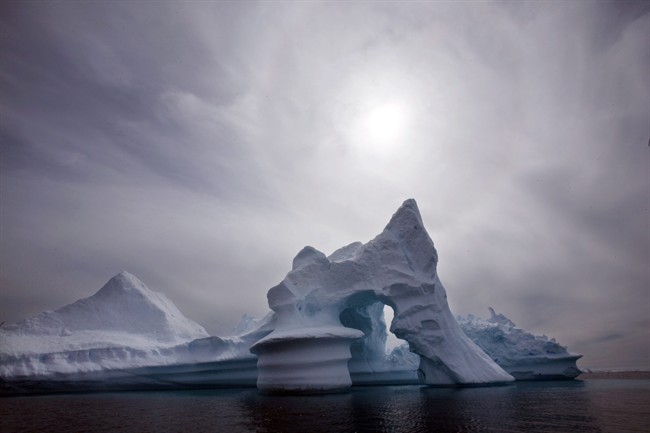I believe in science.

Because I believe in science, I believe in its processes. That means experiments, observations, and conclusions.
I also believe in peer review to test such conclusions.
So it is with considerable consternation that I listen to people who refuse to acknowledge the scientific processes behind the United Nation’s Intergovernmental Panel on Climate Change.
To refuse to acknowledge the 10,000 cited scientific articles and more than 800 authors (259 authors, over 600 contributing authors) from 39 countries, is to deny scientific process.
On Monday from 6-8 p.m. ET, Global News science reporter Nicole Mortillaro will be participating in a live blog on climate change.
The IPCC report is not a conspiracy, despite the so-called “Climategate” of 2009 where thousands of emails from the Climatic Research Unit at the University of Anglia in the United Kingdom were stolen. Climate skeptics used parts of these email exchanges to try to show that there is a worldwide conspiracy at play.
In reality, what was contained in these emails were what you’d call “quote mining,” where you pick and choose what to share to bolster support for your argument.
To have a conspiracy of this magnitude would be to invalidate years of research by tens of thousands of scientists from almost a hundred countries.
My, what a conspiracy that would be.
The evidence is clear: the Earth is warming.
Of course there are natural elements at play. Nobody — not even the climatologists nor the authors of the IPCC report — are denying that.
However, what they are saying – what climate-change skeptics love to ignore – is that mankind is accelerating the warming around the globe.
Just because you don’t want it to be true, doesn’t mean it isn’t.
Yes, the amount of CO2 that we are pumping into the atmosphere is significantly less than what is put in naturally.
But there has always been a checks-and-balance kind of relationship on the planet.
The small amount that we put in is akin to putting in a small amount of water in an already-full dam: it may not be a lot, but it’s enough to push it over the edge in an already-balanced system.
- ‘Shock and disbelief’ after Manitoba school trustee’s Indigenous comments
- Canadian man dies during Texas Ironman event. His widow wants answers as to why
- Several baby products have been recalled by Health Canada. Here’s the list
- ‘Sciatica was gone’: hospital performs robot-assisted spinal surgery in Canadian first
The Arguments
There seem to be a multitude of arguments skeptics use, the vast majority of which are not supported around the world with a multitude of scientific evidence.
Two of the most prevalent arguments are that a) there is not a scientific consensus to support global warming and b) that the global temperature has flatlined since 1998.
Read more on the other side of the argument: Why the IPCC report is flawed
To the first argument, I say, look at the thousands of climatologists around the world and their papers, and look at the IPCC support.
A recent study found that “97.1% endorsed the consensus position that humans are causing global warming.”
There’s your consensus.
For those who claim that Earth has not warmed at all in the past 15 years, that is false.
The National Oceanic and Atmospheric Administration found that 2010 tied 1998 as the warmest global temperature on record.
NOAA recently released its August 2013 report.
“The combined average temperature over global land and ocean surfaces for August 2013 tied with 2005 as the fourth highest in the 1880–2013 record, at 0.62°C (1.12°F) above the 20th century average of 15.6°C (60.1°F).”
Other arguments that people try to use to bolster their claims that climate change isn’t happening, are:
1. The Arctic ice sheet has increased
2. The Antarctic ice sheet is growing
3. Our oceans are cooler than they have been
4. It’s a natural process
Firstly, the Arctic ice sheet has rebounded from 2012 – when it was at its lowest on record.
The National Snow and Ice Data Center out of Boulder, Co., reported that for 2013, the Arctic minimum was 1.69 million square kilometres above the 2012 record minimum. However – and now it’s important to note this – it is still 1.12 million square kilometres BELOW the 1980 to 2010 average.
As for the Antarctic ice sheet, there is an important thing to understand: there is a difference between sea ice and land ice. Sea ice in the Antarctic is definitely growing, and it has been for some time. However, the land ice has been decreasing at an accelerating rate, which in turn is part of the reason why sea ice is increasing.
As for ocean temperatures, the oceans have cooled at the surface. Below the surface, at depths of 700 m or more, the oceans are warming. There are natural reasons for this, el Nino, the 1991 Mount Pinatubo eruption and others. However, research has found that global warming is also causing the warmth of the deeper oceans.
There are many other arguments that climate change skeptics use that I could discuss and continue to refute – with supporting scientific evidence.
But, really, if you choose to ignore 97 percent of scientists and accompanying supporting literature, there’s no convincing you.







Comments